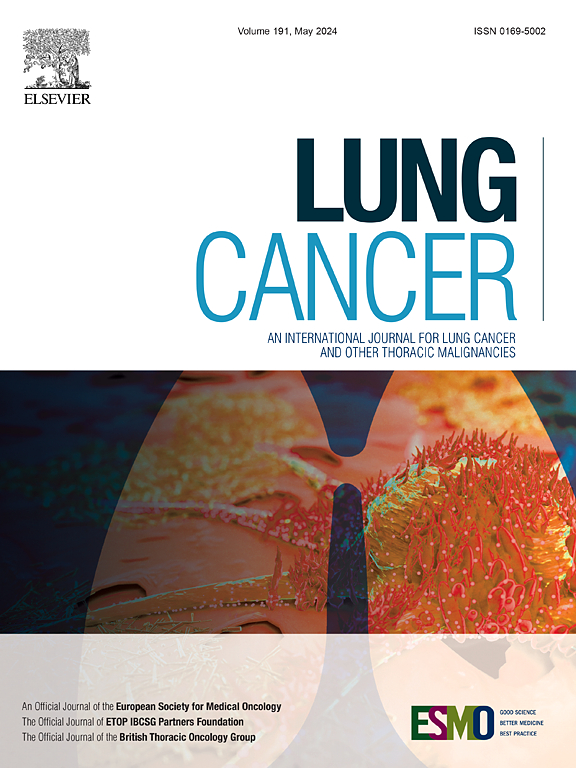Use of immune checkpoint inhibitors in patients with lung cancer and multiple sclerosis
IF 4.5
2区 医学
Q1 ONCOLOGY
引用次数: 0
Abstract
Non-small cell lung cancer (NSCLC) constitutes 80–85% of lung cancer cases and is a leading cause of cancer-related mortality. Most patients are diagnosed at metastatic stages, where curative treatment is rarely an option and the primary goal is to prolong survival while maintaining quality of life. Since NSCLC is often diagnosed in elderly individuals, comorbidities must also be considered in the treatment planning.
Immune evasion is a central hallmark of cancer. By interactions between immune checkpoint molecules, such as programmed death 1 (PD-1) and its ligand PD-L1, as well as cytotoxic T-lymphocyte antigen 4 (CTLA-4), tumors downregulate immune responses, promoting self-tolerance and evading detection. Immune checkpoint inhibitors (ICIs) enhance the autoimmune function against cancer cells by blocking these targets and have wide evidence of efficacy in NSCLC. Currently, ICIs combined with chemotherapy are the standard of care for metastatic NSCLC without actionable mutations. In tumors with high PD-L1 expression, ICI monotherapy is also an effective option.
In some cases, treatment associated toxicities and co-existing morbidities remain a challenge. In the case of patients with autoimmune disorders, they may experience exacerbation of the underlying autoimmune disease following ICI initiation and also an increased risk of immune-related adverse effects (irAE). People with underlying multiple sclerosis (MS) have mostly been excluded from clinical trials of ICIs, so data on their safety in the setting of MS is limited.
This report presents three clinical cases from our institution involving patients with NSCLC and pre-existing MS who were treated with ICIs.
免疫检查点抑制剂在肺癌和多发性硬化症患者中的应用
非小细胞肺癌(NSCLC)占肺癌病例的80-85%,是癌症相关死亡的主要原因。大多数患者被诊断为转移期,在这个阶段,治愈性治疗很少是一种选择,主要目标是延长生存时间,同时保持生活质量。由于非小细胞肺癌通常在老年人中诊断,因此在治疗计划中也必须考虑合并症。免疫逃避是癌症的主要特征。通过程序性死亡1 (PD-1)及其配体PD-L1以及细胞毒性t淋巴细胞抗原4 (CTLA-4)等免疫检查点分子之间的相互作用,肿瘤下调免疫应答,促进自身耐受并逃避检测。免疫检查点抑制剂(ICIs)通过阻断这些靶点来增强对癌细胞的自身免疫功能,并且在非小细胞肺癌中有广泛的疗效证据。目前,ICIs联合化疗是无可操作突变的转移性NSCLC的标准治疗方案。在PD-L1高表达的肿瘤中,ICI单药治疗也是一种有效的选择。在某些情况下,治疗相关的毒性和共存的发病率仍然是一个挑战。对于患有自身免疫性疾病的患者,他们可能会在ICI开始后经历潜在自身免疫性疾病的恶化,并且免疫相关不良反应(irAE)的风险也会增加。患有潜在多发性硬化症(MS)的人大多被排除在ICIs的临床试验之外,因此关于其在MS背景下的安全性的数据有限。本报告报告了我们机构的三个临床病例,涉及非小细胞肺癌和既往MS患者接受ICIs治疗。
本文章由计算机程序翻译,如有差异,请以英文原文为准。
求助全文
约1分钟内获得全文
求助全文
来源期刊

Lung Cancer
医学-呼吸系统
CiteScore
9.40
自引率
3.80%
发文量
407
审稿时长
25 days
期刊介绍:
Lung Cancer is an international publication covering the clinical, translational and basic science of malignancies of the lung and chest region.Original research articles, early reports, review articles, editorials and correspondence covering the prevention, epidemiology and etiology, basic biology, pathology, clinical assessment, surgery, chemotherapy, radiotherapy, combined treatment modalities, other treatment modalities and outcomes of lung cancer are welcome.
 求助内容:
求助内容: 应助结果提醒方式:
应助结果提醒方式:


